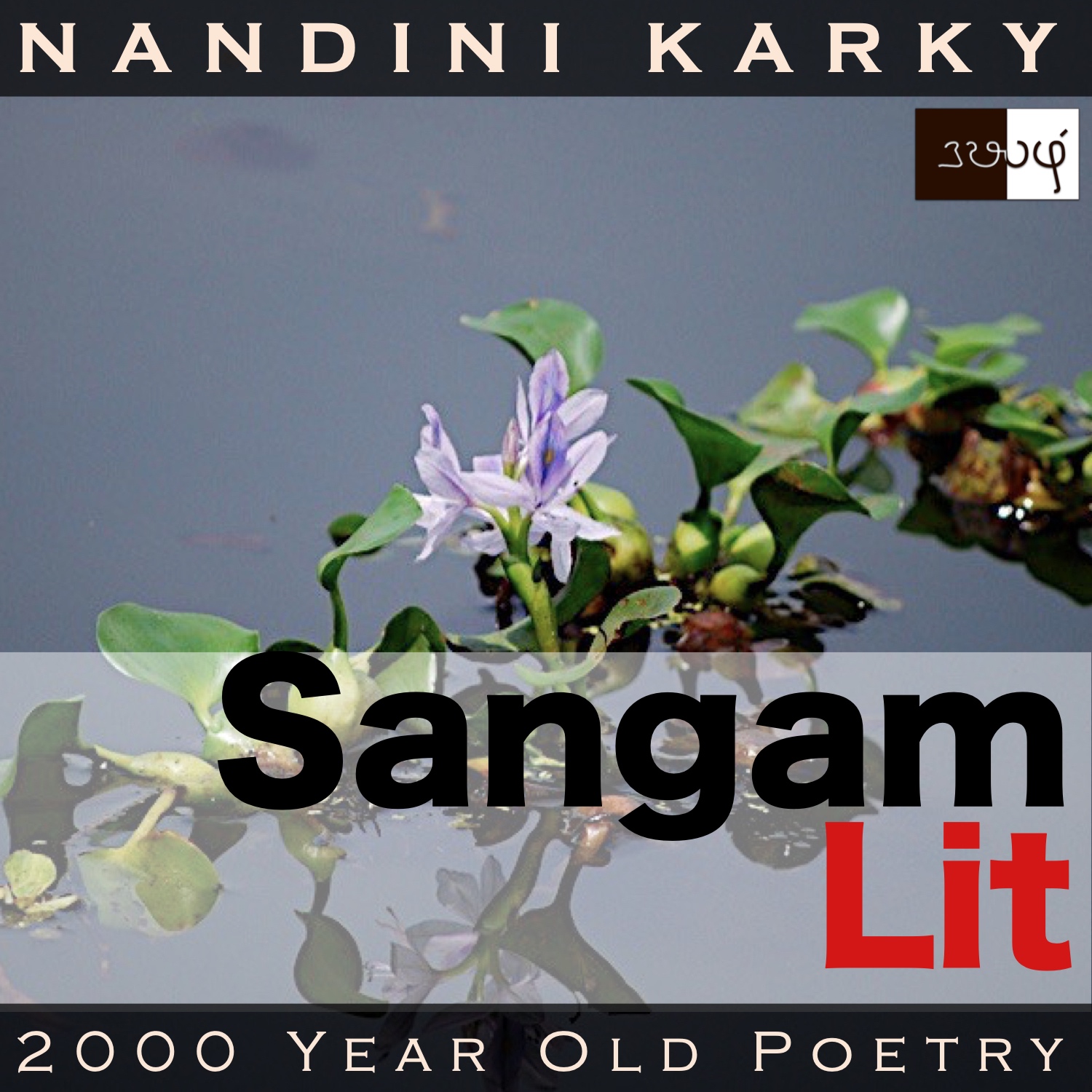Podcast: Play in new window | Download
Subscribe: Apple Podcasts | Spotify | Amazon Music | Android | iHeartRadio | Email | TuneIn | RSS | More

In this episode, we understand the thread that ties economics and emotions, as portrayed in Sangam Literary work, Natrinai 183, penned by an anonymous poet. The verse is set in the coastal landscape of ‘Neythal’ and speaks in the voice of the confidante to the man, expressing the pain the lady would feel at his parting away.
தம் நாட்டு விளைந்த வெண்ணெல் தந்து,
பிற நாட்டு உப்பின் கொள்ளை சாற்றி,
நெடு நெறி ஒழுகை நிலவு மணல் நீந்தி,
அவண் உறை முனிந்த ஒக்கலொடு புலம் பெயர்ந்து,
உமணர் போகலும் இன்னாதாகும்-
மடவை மன்ற-கொண்க!-வயின்தோறு
இன்னாது அலைக்கும் ஊதையொடு ஓரும்
நும் இல் புலம்பின் மாலையும் உடைத்தே;
இன மீன் ஆர்ந்த வெண் குருகு மிதித்த
வறு நீர் நெய்தல் போல,
வாழாள் ஆதல் சூழாதோயே.
The poem opens by illustrating an exchange of commodities like ‘வெண்ணெல்’ meaning ‘paddy’ and ‘உப்பு’ meaning ‘salt’. Close by, we find the word ‘ஒழுகை’ referring to ‘a train of carts’ and brings before our eyes, ancient travellers sailing on land with the ships of their caravans. Speaking of sailing on land, the poem too uses the picturesque phrase ‘நிலவு மணல் நீந்தி’ which means ‘to swim on moon-like sands’. Then we turn our attention to ‘நும் இல் புலம்பின் மாலை’ which talks about ‘an evening of loneliness without your company’. Thereafter, the living symbols of the coastal land greet us as we meet ‘வெண் குருகு’ ‘white sea bird’ and ‘நெய்தல்’, ‘the blue water-lily’, which gives this land its name. Time to listen closely to the echoes from this nation of waves!
The man and lady have been in a love relationship when the man decides that he must part with the lady to gather wealth for their wedding. The man conveys his intention to part away to the lady’s confidante. Hearing this, she says, “Giving the paddy that grows in their land, the townspeople accept abundant heaps of salt from another land. The salt merchants traverse moon-like sands in a long train of carts, with their kith and kin from that coastal land. When these travelling salt merchants leave, the town misses them and suffers in pain. You are indeed ignorant, O lord! The northern winds does make one suffer. But, added to that, a lonely evening without you would make it unbearable. Like the blue lily in a shallow pond, stepped on by a white seabird that has fed itself with a lot of fish, she too shall not live. But, you seem not to consider that!” With these words, the confidante stresses that the lady does not possess the strength to bear with the separation of the man, as he journeys to gather wealth and she insists that he should take the lady along.
Now, for the hidden connections! The confidante opens the discussion by bringing forth a scene from an ancient market. There, you find, farmers giving their paddy and taking heaps of salt in return. Theirs is a fertile land, with copious flow of water, just right to rear paddy. But, they can’t find salt anywhere in their land although it’s important to them. These farmers do not have to travel to get what they want. Salt comes to their doorstep, riding on carts that have journeyed from the coastal lands. The salt merchants cannot afford to stay where they are, in their marshlands, and expect food to find its way to them. They travel in huge groups, as families, and take the salt to other regions. There’s only so much salt these merchants can exchange in one town and after their barter is over, they have to move on, to other lands. That is the inevitable truth. And yet, when these travelling merchants leave the town, the townspeople suffer missing them. Why does the confidante elaborate on this ancient economic activity? What does that have to do with the man leaving? Let’s delve deeper to find out.
The confidante turns to the man and uses strong words saying he must be foolish, not to consider a vital fact. For not only will the cold winds blow, but the evenings without him will be insufferable to the lady. She wraps it up by evoking the image of a blue lily that floats on a drying-up pond. A frail flower like that, if stepped on by a seabird with its tummy full of fish, will perish. Such will be the fate of the lady, the confidante says. Now, we understand that the reference to those salt merchants is to say that even when strangers from another land live with one for a while and part away, there is pain. Imagine the intensity of that pain when it’s the parting of a beloved. It’s for this reason she calls the man ignorant! Beyond the fragility of the lady or the wisdom of the confidante, the thing I wish to focus on, is the kind of affection that these ancient Tamil people seem to have throbbing within them. To have a heart that misses another tribe of people from far away, who travel for trade, no way their kith and kin, goes to show the deep humanity within!




Share your thoughts...